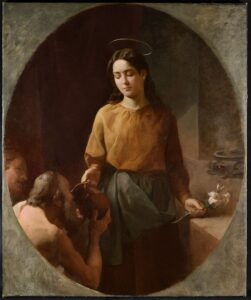TGIF! We conclude this week of Saintly Sixteen action with Zita vs. Julian of Norwich for a shot at Joseph of Arimathea in the Elate Eight.
Yesterday, Ambrose of Milan took down Gertrude the Great 64% to 36%. It'll be Ambrose vs. Andrew in the next round.
The Saintly Sixteen will conclude on Monday as Clare of Assisi takes on Henry Whipple. And then it will be on to everyone's favorite (or not) round, the round of Saintly Kitsch. But more about that later.
Vote now!
Zita
 Zita tiptoed down the back stairs of the Fatinelli castle in Tuscany in the early hours of the morning. Her chores awaited and she was afraid of being late. The lashes to the back of her legs still ached this morning when she had inadvertently angered the master although there were no signs of the beating. As she descended, she breathed deep and whispered to God, “please let the work of my baking help feed those around me.”
Zita tiptoed down the back stairs of the Fatinelli castle in Tuscany in the early hours of the morning. Her chores awaited and she was afraid of being late. The lashes to the back of her legs still ached this morning when she had inadvertently angered the master although there were no signs of the beating. As she descended, she breathed deep and whispered to God, “please let the work of my baking help feed those around me.”
Zita entered the kitchen and restocked the fire. Maria was there glaring at her. She was sure she would be accused of some wrongdoing as Maria always seemed to be out to get her. Zita greeted Maria with a “Buongiorno” and headed to the garden to gather flowers for the Nonna down the street who was ill in bed. She would check on her in her afternoon rounds of delivering food, herbs, parts of her wages, and flowers to those in need.
But until then, Zita had baking and restocking of the pantry to do. As she entered back into the kitchen, Zita took pause. Maria had called the master down to complain about her giving to the poor. Maria opened the door to show the master the pantry, but it remained fully stocked. But it did not matter, the master had been called, and he was angry. He grabbed Zita by the arm and began hitting her. Zita prayed as she was hit. She prayed for those who were worse off than her. She prayed for the master that his anger would dissipate. She prayed that Maria would learn to like her. She prayed that she could continue to serve the poor, the lonely and the sick and she continued to pray that God would protect her in the Fatinelli household. She was tired of being hit. “Please stop,” Zita asked of Master Fatinelli.
Abruptly, the master stopped. There were no marks on Zita’s skin. Zita was incorruptible. Master Fatinelli backed away muttering and crossing himself. Maria’s eyes were wide and she crossed herself. Zita gave thanks to God for his presence and protection and left to care for the poor.
*This is an entirely historical-fictionalized account of Zita’s life. There are no quirks or quotes to pull, but I wanted to put myself into the life of Zita that we know and write from her perspective of faith, grace and service.
— Anna Fitch Courie
Julian of Norwich
 Julian’s Revelations of Divine Love, is filled with quotes, passages, and images of God that have inspired, challenged, and comforted countless people of faith through the ages. Her text, the earliest known writing by an English woman, reflects a woman with a deep, sensory faith who can communicate the wisdom and insight she experiences in eloquent, poetic, and lyrical words.
Julian’s Revelations of Divine Love, is filled with quotes, passages, and images of God that have inspired, challenged, and comforted countless people of faith through the ages. Her text, the earliest known writing by an English woman, reflects a woman with a deep, sensory faith who can communicate the wisdom and insight she experiences in eloquent, poetic, and lyrical words.
Two of her quotes, however, resonate particularly to so many because they remind us of the presence of Christ’s love in the fullness of our lives – the messiness, the hardships, and the suffering as well as the joy – and because they remind us of God’s masculine and feminine qualities – a daring theological writing in her day, definitely.
The best-known quote from Revelations is likely, “All shall be well, and all shall be well, and all manner of thing shall be well.” These 17 words, written as part of Julian’s vision, have been quoted throughout centuries, inspiring artists as they continue to share her contemplative astuteness.
They appear in TS Eliot’s 1942 poem Little Gidding, the fourth and final poem of Eliot’s Four Quartets. Eliot wrote the poem during World War II, a time of great suffering, reflecting on how suffering may be redeemed by God’s love.
‘Sin is Behovely, but
All shall be well, and
All manner of thing shall be well.’
Another great Anglican theologian, C. S. Lewis, also quotes Julian in A Grief Observed, where he writes after his wife’s death. Lewis shares of his awareness of the space of grief: “Two widely different convictions press more and more on my mind. One is that the Eternal Vet is even more inexorable and the possible operations even more painful than our severest imaginings can forbode. But the other, that ‘all shall be well, and all shall be well, and all manner of thing shall be well’.”
Julian’s writing of God as our Mother is also part of her spiritual legacy. In a Church that has long eschewed the holy feminine, Julian reminds us that God is not a boy’s name.
She writes: “God is our Mother as truly as he is our Father; and he showed this in everything, and especially, in the sweet words where he says, ‘It is I,’ that is to say, ‘It is I: the power and goodness of fatherhood. It is I: the wisdom of motherhood. It is I: the light and grace which is all blessed love. It is I: the unity. I am the sovereign goodness of all manner of things. It is I that make you love. It is I that make you long. It is I: the eternal fulfilment of all true desires.”
To pick a handful of quotes from the text is almost impossible, given that almost every word carries a substantial weight of holy insight. We give thanks for every word she wrote, that they may continue to call us to contemplate Christ.
56 comments on “Zita vs. Julian of Norwich”
My lack of bracket successes this year has been both historically bad & hysterically funny; except when it comes to Julian! I was so moved by Anna Fitch Courie’s account of a day in the life of Zita - particularly in light of our current societal realities - but I would love a Golden Halo for Julian of Norwich (and the mug:)
Recaptcha isn’t working today. I have been circling the drain for a few hours now and I’m beginning to think that I am a robot!
I voted for Julian because remembering "All shall be well, and all shall be well, and all manner of things shall be well." has gotten me through some really tough times.
But Zita's write-up was a treasure and however fictionalized it "felt" very real. Hers was a life I can strive to emulate while I remind myself "All shall be well, and all shall be well, and all manner of things shall be well."
That was some awesome writing, Anna Fitch Courie! It read like the first page of a book I'd love to read.
When will Ambrose advance to the Elite 8??? Update Bracket please!
Every Saint is to be honored, they are all truly remarkable. I appreciate all your writings and sharing with us. Love them all!
Please advance Ambrose to the Elate 8 -- AKA update the current Bracket!
Please advance Ambrose to the Elate 8 -- AKA update the current Bracket! Please
If ever we needed the words of Julian it is now.
So no question that Julian of Norwich is the obvious chance, but given little to work with, Anna Fitch Courier knocked herself out to come up with a good story for Zita. I cast my vote there, even knowing before I saw the results what they would be.
*choice
*Courie Did I mention how much I hate autocorrect?
Please update the bracket for 2024. Ambrose needs to advance to the Elate 8.
Please update the bracket for 2024. Ambrose needs to advance to the Elate 8. Why is this hard to do?
When peace like a river, attendeth my way
When sorrows like sea billows roll
Whatever my lot, thou hast taught me to say
It is well, it is well, with my soul
It is well
With my soul
It is well, it is well with my soul.
I sang this as my mother was dying and have sung it through all my darkest hours. I had to vote for Julian
Even tho I knew that Julian will win by a landslide - I had to vote for Zita. Poor Girl, beaten unmercifully, physically abused, yet she gave of herself to those less fortunate. She prayed for Maria, She prayed for the Master, she prayed that she would be able to stil take care of those worse off than herself, And she prayed that her Masters anger would disipate. God heard that prayer and suddenly the Master stopped, crossed himself and left. A beautiful connection of Love.
When I am in the throes of anxiety, I say “All shall be well and all shall be well and all manner of things all shall be well”. It is a calming mantra and reminds me of who is in charge over things in my life.
Who better to guide us in times of trial but Julian of Norwich?